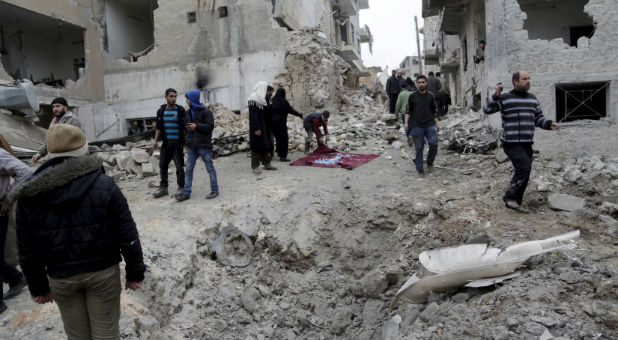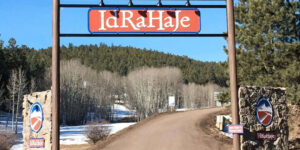What Christians Endure Under Islamic Terror
When John, a Syrian Christian, chose to stay in Raqqa after the Islamic State took control of the city in 2014, he had no idea how he would survive. Thousands abandoned the city, believing it better to save their lives than live at the center of the Islamists’ new “caliphate”. John survived in Raqqa for 18 months before escaping in the middle of the night. He told World Watch Monitor about a life of frequent harassment, witnessing weekly executions, and the sadness of ordinary Syrians who welcomed Islamic State fighters at first, but grew to regret giving them their support.
John is in his early 20s. He can’t say his real name, what he is studying, or in what type of business his parents were involved.
“Life in Raqqa carries on as usual in many ways. Shops and restaurants are open. There is food, electricity, and water. People are more fortunate than those living in a city like Aleppo.”
“But you’re constantly alert, never looking into someone’s eyes when walking on the street; always aware of what to say and not to say.”
Islamic State troops won the battle for Raqqa in January 2014. After a week of intense fighting with other radical groups, they took control and declared it the capital of their caliphate.
“Before [IS won the battle] we had a scary week. We stayed in our house because everyone on the streets was being shot at.”
John watched from the side-lines as the streets filled with people shouting “Allahu Akbar” (Allah is the greatest).
“I didn’t shout it—I am a Christian. But when an IS man saw me being silent, he stopped the car. I had to say ‘Allahu Akbar‘ too.
“Many in Raqqa welcomed IS, but they all now regret it. “Soon people discovered that things had radically changed. IS started executing those they suspected to be supporters of the president or of having fought with other rebel groups against IS.
In the same week that Islamic State declared Raqqa their capital, they destroyed the interior of three churches.
“They broke everything inside—the icons, the altar, everything. One church building is now a center for IS.”
Nobody was forced to stay in the new caliphate, and many left. In some ways life returned to normal, John said, but it was soon clear that the city was under the control of IS. They changed the names of public buildings, “Islamic State” was printed on car number plates and the group banned the use of new bank notes printed by the Syrian government.
Soon after IS declared Raqqa their capital, Christians were told how they could live under IS rule.
“We could [convert and] become Muslims and live a normal life in Raqqa, we could leave, or we could stay and pay the jizya tax. The first year the tax was 54,000 Syrian pounds [about US$300] per man—women and children are not ‘taxed’—but last year the rate went up to 164,000 Syrian pounds per man.”
The price of gold is used to calculate the jizya; in Islamic tradition it is 16 to 18 grams of gold per year per man.
John advised his parents to leave Raqqa, but they didn’t want to abandon their home and business, and selling them was impossible. Even though many of the estimated 1,500 Christian families left, they stayed; at least it meant John could continue his studies.
John soon witnessed how IS dealt with those who didn’t obey their rules.
“I saw a lot of cruelty. Every Friday they executed people. I was there when they beheaded the first man in public. They couldn’t behead him with the first cut. He suffered so much they finally shot him.”
John described how sick he felt when IS beheaded hundreds of soldiers from Raqqa’s Syrian Army base and then pinned their heads on the fence he passed daily on his way to work. He felt IS soldiers were monsters, who could attack at any moment and for any reason.
“When I talked with them, I had to know what to say. A wrong word could offend them. Seeing all these atrocities, they don’t seem like people, they seem like monsters to me, especially after what they did to those soldiers. This traumatised me. It was too much.
“IS hung their crosses from their ears when they put their heads on the fence. What shocked me too was that I saw people taking selfies with the heads. I believe they do this to scare people, to show them what happens when you do something wrong.”
Despite the horrors he witnessed, John stayed in Raqqa because he wanted to work and continue his studies, and paying the jizya gave him some freedom.
“Because we paid the tax and had the declaration [confirming the tax was paid] always with us, no one could harm us for being a Christian.”
The protection was important because John had to deal with IS men every day.
“I met them at work, in the shops, even in the gym.”
Only 50 Christian families left in Raqqa
It is remarkable how much John smiles when he talks about living in Raqqa.
“I got used to it. I think it has something to do with how we grew up as Christians; we’re strong people, this helped us to stay. And, yes, you can live as a Christian in the Islamic State. No one troubles you when you pay the tax.”
However, John knows of only 50 Christian families left there. The only priest left as soon as IS took over. There is no church remaining—Christians visit each other for fellowship.
“I didn’t see them mistreat Christians because of their faith. The only thing they did was to take the homes of Christians—and anyone else—who had left Raqqa, because their soldiers didn’t have enough houses to live in.
“We never imagined this could happen. Christians in Raqqa were respected. It was a normal Syrian city with no radical Islamic population. In my opinion, what IS is doing isn’t real Islam. I have lived with Muslims my whole life; we respected each other and lived peacefully together.”
Some IS fighters were former Christians
Despite their cruelty, John said IS fighters were normal people.
“I could talk with them normally. It was only sometimes when they discovered that I was a Christian that they changed. They were sometimes funny. Once in the gym I heard them telling jokes, albeit about all the heads they had cut off. At different times we had conversations about me being a Christian. They advised me to become a Muslim. Once I was really shocked after talking with two of them. They turned out to be Armenians. They told me that they grew up in Christian families, that both of them had converted from Christianity to Islam. Their beards were not that long yet, they were quite new in IS. I later heard that one of them blew himself up as a suicide bomber.
“One day on a bus I met one of my old classmates. He was wearing IS clothes, had a long beard, and held a machine gun. He was convinced of the choice he had made, saying he wanted to fight for Islam and the Koran. Two weeks later he was killed in battle.
“I heard they send Syrian fighters to the frontlines; the foreigners have leadership positions. A week later the brother of this classmate also died fighting for IS. I know of one other friend of mine who joined IS. I don’t know what happened to him.”




























































